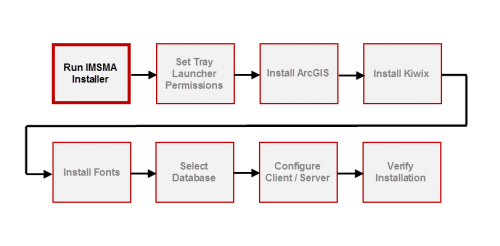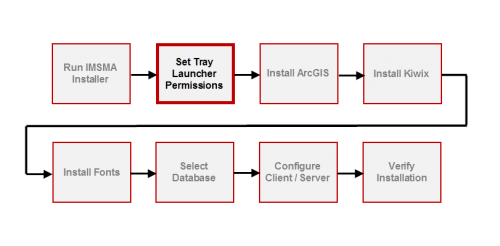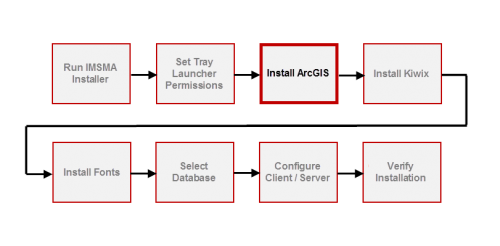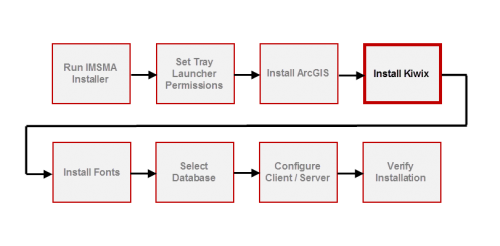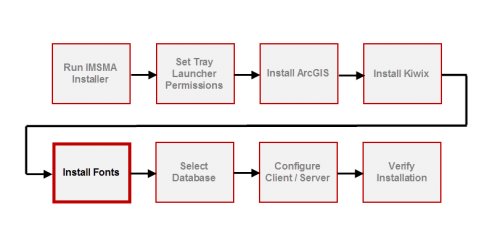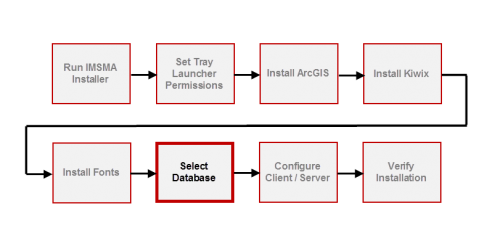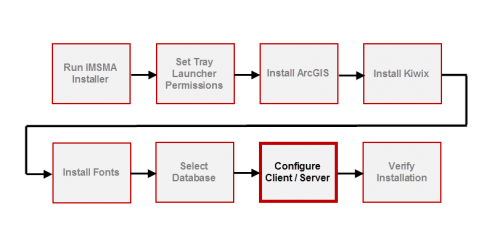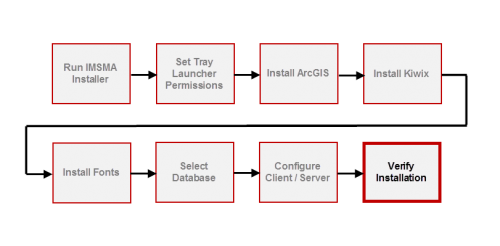Difference between revisions of "Install IMSMANG Version 6"
| Line 3: | Line 3: | ||
==Computer Requirements==__NOEDITSECTION__ | ==Computer Requirements==__NOEDITSECTION__ | ||
The computer running IMSMA<sup>NG</sup> may have one of the following operating systems: | The computer running IMSMA<sup>NG</sup> may have one of the following operating systems: | ||
| − | * Windows® XP Professional Service Pack 2 | + | * Windows® XP Professional 32 bits Service Pack 3 and for 64 bits Service Pack 2 |
* Windows Vista | * Windows Vista | ||
* Windows 7 | * Windows 7 | ||
| Line 30: | Line 30: | ||
<ol> | <ol> | ||
<li>Double-click the '''Install_IMSMA.exe''' file in the installation package.</li> | <li>Double-click the '''Install_IMSMA.exe''' file in the installation package.</li> | ||
| − | <li>When the command window displays, | + | <li>When the command window displays, follow the instructions.</li> |
<li>On the Language Selection window, select the language you want to use during installation and click '''OK'''.</li> | <li>On the Language Selection window, select the language you want to use during installation and click '''OK'''.</li> | ||
<li>Navigate the Installation windows of the graphical installer as described below:</li> | <li>Navigate the Installation windows of the graphical installer as described below:</li> | ||
Revision as of 13:51, 9 September 2013
Computer Requirements
The computer running IMSMANG may have one of the following operating systems:
- Windows® XP Professional 32 bits Service Pack 3 and for 64 bits Service Pack 2
- Windows Vista
- Windows 7
- Windows Server 2003
- Windows Server 2008
The computer must have:
- A minimum 800 Mhz Pentium® or Xeon® processor (inter-workstation or server), or x86-compatible processor (AMD-K7™/Athlon™/Duron™/Sempron™)
- TCP/IP support
- 10/100 Mbps network adaptor
- A minimum screen resolution of 1024 x 768, with 256+ colours
- 3 GB free disk space on C-drive
- minimum memory setting 1,024 MB
| |
If you are upgrading from previous IMSMA NG versions, please read the upgrade documentation first. |
Part 1. Run the IMSMA Installer
Running the IMSMA Installer
- Double-click the Install_IMSMA.exe file in the installation package.
- When the command window displays, follow the instructions.
- On the Language Selection window, select the language you want to use during installation and click OK.
- Navigate the Installation windows of the graphical installer as described below:
- In the Welcome window, click Next.
- Select the I accept the terms of this license agreement option, and click Next.
- We strongly recommend to use the default installation path for IMSMANG. Click Next.
- If the target folder does not already exist a message will be shown, click OK.
- In the packages selection window, click Next.
- Wait for the installation progress bar to finish, then click Next.
- When the Setup Shortcuts window displays, click Next.
- When the installation has completed successfully, click Done.
- When prompted by the command window, press any key on the keyboard to continue.
| |
When the graphical installer has finished the focus goes back to the command window and the next steps of the installation continue so please do not close the command window. |
Part 2. Set Permissions for the Tray Launcher
Setting Tray Launcher Permissions
- On your desktop, right-click the IMSMA Tray Launcher icon and select the Properties option.
- On the IMSMA Tray Launcher Properties window, select the Shortcut tab, then click Advanced.
- On the Advanced Properties window, check the Run as administrator checkbox, then click OK.
- On the IMSMA Tray Launcher Properties window, click OK.
Part 3. Install Supporting Software
- On your desktop, double-click the IMSMA Tray Launcher icon.
- If any supporting software or fonts need to be installed, a message will display notifying you which ones are required. Click OK to begin the process(es).
Part 3A. ArcEngine 10.1
Installing ArcGIS
- On the Welcome window, wait for the setup to compute space requirements, and then click Next.
- On the License Agreement window, select the I accept the license agreement option, and then click Next.
- On the Select Installation Type window, verify that the Complete option is selected, and then click Next.
- On the Destination Folder window, click Next.
- On the Python Destination Folder window, click Next.
- On the Ready to Install the Application window, click Next.
- On the Updating System window, wait for the progress bar to finish.
- When ArcGIS has been successfully installed, click Finish.
Part 3B. Kiwix
Installing Kiwix
- On the Installer Language dialog, select the language you want to use during installation, and then click OK.
- When the Kiwix Setup window displays, click License Agreement.
- After reading the license agreement, click I Agree.
- Click Next.
- On the Installing window, wait for the progress bar to finish, and then click Next.
- When Kiwix has been installed on your computer, unselect Start Kiwix and click Finish.
Part 3C. Fonts
Installing Fonts
The fonts IMSMA 2006.ttf, IMSMA 2006 2.ttf and IMSMA2009.ttf files will be installed on your computer.
Part 4. Database
Selecting Database
If you do not have a database to restore than you should create a start-up IMSMANG database.
| If you want to... | Do... |
|---|---|
| start up the database | see the initial database section below. |
| restore the database | see the upgrade instructions. |
Initial Database
To create the initial database:
- Open the c:\imsmang\database folder.
- Double-click the install_initial.bat file.
- In the command window, enter password.
- Press the [Enter] key.
- When prompted to press any key to continue, press a key on the keyboard.
Part 5 Client/Server
Configuring Client/Server
If you will use IMSMA as a stand-alone installation, skip Part 5.
To configure the server in a client / server installation:
- Navigate to the c:\imsmang\server\imsmaserver\conf directory.
- Open the GisService.properties file.
- Set the fileserverURI.base property to http://localhost:8080 where localhost is the name or IP address of the IMSMANG server.
- Save the changes to the file.
To configure the client in a client / server installation:
- Start the TrayLauncher.
- Select the IMSMA Client Configuration Tool option.
- Select the value for the java.naming.provider.url property.
- Set the java.naming.provider.url value to hostname.domain replacing hostname and domain with the appropriate values, or to the IP address of the server.
- Press the [Enter] key.
- Set the value for the isClientOnly property.
- Enter “true” in the Value cell for the isClientOnly property.
- Press the [Enter] key.
- Set the value for the AlwaysSyncGeodata property.
- Enter “false” in the Value cell for the AlwaysSyncGeodata property.
- Press the [Enter] key.
- Click the Save button.
- The Your changes have been saved message displays.
- Click the OK button.
- Click the Exit button.
Part 6. ArcEngine License
Obtaining ArcGIS License
(This section will be written when the issue is solved.)
The IMSMANG installation is now complete. You may now start the server and client.
